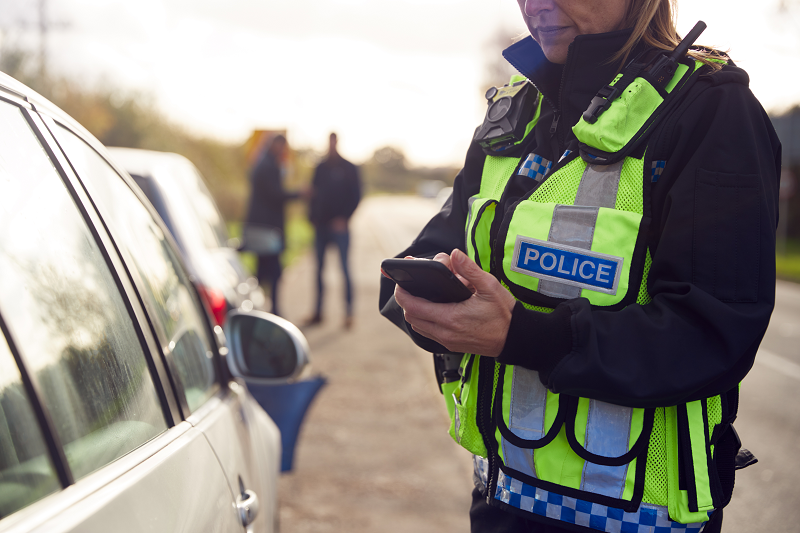The third series of BBC police drama Happy Valley marked the end of a beloved programme, and the end of Sergeant Catherine Cawood’s career navigating Yorkshire’s criminal underworld. Cawood’s age and gender is not ignored in the show. Throughout, she faces misogyny from criminals she encounters on the job, as well as her own colleagues.
While police forces themselves are currently addressing the fallout from decades of endemic sexism, women police officers – whether in fiction or reality – senior or rookie, regularly face sexist criticism of their appearance and abilities.
While police forces themselves are currently addressing the fallout from decades of endemic sexism, women police officers – whether in fiction or reality – senior or rookie, regularly face sexist criticism of their appearance and abilities.
Online abuse has become a common occurrence in public-facing occupations. I conducted 50 in-depth interviews with women working in the public sector, including politicians, journalists and police officers. All the women I spoke to had been on the receiving end of gendered abuse, which occurred whenever they spoke publicly about their work. This abuse was widespread, and took place across all social media platforms.
The nature of this abuse differed by occupation. Politicians and journalists were most likely to receive physical threats. But police officers were more likely to receive negative comments regarding their appearance, age and competence.
Worryingly, the women police officers I spoke to explained how a significant amount of abuse came from people who described themselves as current or retired police officers. This is reflective of wider occupational police culture, which has historically been resistant to the presence of women.
Research published in 2021 reported that 89% of police forces in the UK have a higher proportion of men at senior levels (chief inspector and above) than within their force overall. This is up from 76% of forces in 2020.
With some exceptions, the data shows that women in policing struggle to be promoted to the top positions. Although there is evidence that this is changing: 40% of the UK’s 49 chief constables are women, 19 – as opposed to just four in 2019.
But overall, men are over-represented in the higher echelons of most police forces. Research published in 2021 reported that 89% of police forces in the UK have a higher proportion of men at senior levels (chief inspector and above) than within their force overall. This is up from 76% of forces in 2020.
And, even when they do make it to the top, they aren’t exempt from abuse. Earlier research has found that sexual harassment within police forces often stems from a male-dominated workplace culture that encourages resentment of women who get promoted.
Online vitriol
Much of the abuse that women police officers receive online focuses on their physical characteristics. As two senior police officers told me: “It’s just an obsession with commentating on how you look all the time. I have a group of trolls, who are really obsessed with my teeth. Every time I post anything, they zoom in on my teeth and comment on them. It’s really quite bizarre.
People comment on your looks … the clothes that you’re wearing, your hair, your eyes. There’ll come a point when we all decide to come off social media.
“People comment on your looks … the clothes that you’re wearing, your hair, your eyes. There’ll come a point when we all decide to come off social media.”
In some cases, officers reported receiving comments that appeared to have more malevolent intent beyond trolling: “There’s been some real vitriol, when I look around some of the real high profile things that have happened … It’s often around someone’s competence linked to their gender, and very much how they look.
“A complaint was made about me to the police and crime commissioner, saying I had no standards, and I was letting the police down by the way I was dressed.”
Officers also said their online abusers focused on their age to insult them. “You rarely see abuse directed at men. If there was a senior policeman who was grey and wrinkly, it doesn’t get mentioned. Yet women who are in senior positions, it seems ok to either go, “cor, she’s hot stuff”, at one end of the spectrum, or at the other end, to give whatever amount of abuse you want to dish out, as to how somebody looks as they get older.”
Comments like this are not just the purview of anonymous online commentators. After a press conference about the search for missing Lancashire woman Nicola Bulley, journalist Amanda Platell criticised the lead detective for wearing a dress and having straightened hair, tweeting “is she auditioning for Love Island for midlifers.” Many people came to the detective’s defence, including other top police officers.
But comments like this are all too frequent online.
In real life and on screen, women police officers often feel their expertise and abilities are questioned more than their male counterparts
Preventing and combating misogyny
Addressing the causes of such misogynistic online abuse is crucial if change in the attitudes, behaviour and language used towards women police officers is to be achieved. But this is easier said than done. To make real change, transformation must occur at three levels: individually, in the force, and in wider society.
The entire police service needs to become much more aware of the level and danger of online abuse their officers face, and reminded that their duty of care for staff extends into the online space.
Police officers should be helped to manage their online presence in a safer way. Simple techniques such as blocking, muting and reporting, could become part of police training, to provide a buffer between the officer and the abuser. While these tactics don’t address misogyny in culture, they allow women to continue taking part in the online discussion without having to trawl through abuse.
At an organisational level, all the women I spoke to emphasised the need for greater regulation of online platforms – something that would be handed to Ofcom if the online safety bill ever completes its passage into law. The entire police service needs to become much more aware of the level and danger of online abuse their officers face, and reminded that their duty of care for staff extends into the online space.
Addressing societal misogyny is more complicated. Online abuse needs to be both legally prohibited and culturally unacceptable. A starting point is both men and women working to identify, call out and report abusive behaviour.
If the police are to have any hope of addressing the misogynistic culture that is now in the spotlight, these changes are vital to recruit and retain a female workforce, and to ensure that the focus in high profile investigations remains on the facts of the case.
This article first appeared on The Conversation, and is republished under a Creative Commons Licence; you can read the original here.
About the author
 Susan Watson has extensive interdisciplinary experience in criminal justice, social policy and politics. Before embarking on an academic career as a mature student, Susan worked in political campaigning, research and policy development. She has previously worked as a staffer for a major political party, as a Parliamentary Researcher on the House of Commons Home Affairs Select Committee, and as a researcher for numerous elected representatives. Susan has significant experience in the criminal justice and social policy sectors, and has provided leadership, strategic direction, and policy development advice to a number of public and third-sector bodies. She now combines her past professional knowledge with her more recent teaching experience, with an emphasis on criminal justice and social policy.
Susan Watson has extensive interdisciplinary experience in criminal justice, social policy and politics. Before embarking on an academic career as a mature student, Susan worked in political campaigning, research and policy development. She has previously worked as a staffer for a major political party, as a Parliamentary Researcher on the House of Commons Home Affairs Select Committee, and as a researcher for numerous elected representatives. Susan has significant experience in the criminal justice and social policy sectors, and has provided leadership, strategic direction, and policy development advice to a number of public and third-sector bodies. She now combines her past professional knowledge with her more recent teaching experience, with an emphasis on criminal justice and social policy.
Picture © Monkey Business Images / Shutterstock



Dare I suggest that we introduce candour to our student police officer training and talk about real-life examples for female officers and female civilian staff.
Challenging people by calling out their inappropriate behaviours is laudable. Equally, the reality of how difficult it can be to speak up should also be discussed. For example, as a Response officer, if you call out someone’s behaviour, it subsequently detracts from the purpose of that particular job you are responding to and is not an effective way of raising the issue.
Colleagues, both male and female, can therefore be inadvertent bystanders due to this. It is not a criticism of colleagues – it is endemic within society, as per your article
I have encountered this on every set of shifts. The only way to address it is to ignore the person or group of people making the comments. A very complex and deeply ingrained issue